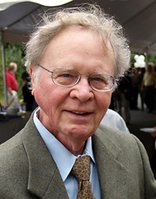Broecker, Wallace S.
Wallace S. Broecker ("Wally") (born 1931) is the Newberry Professor in the Department of Earth and Environmental Sciences at Columbia University and a scientist at Columbia's Lamont-Doherty Earth Observatory.
Broecker's areas of research include Pleistocene geochronology, radiocarbon dating and chemical oceanography, including oceanic mixing based on stable and radioisotope distribution. This included research on the biogeochemical cycles of the element carbon and on the record of climate change contained in polar ice and ocean sediments.
He attended Wheaton College and interacted with J. Laurence Kulp and Paul Gast. Broecker then transferred to Columbia University. At Columbia, he worked at the Lamont Geological Observatory with W. Maurice Ewing and Walter Bucher.
He began his research in the 1950s with the development of techniques for measuring the radiocarbon content of ocean water (Seawater) and the ages and accumulation rates of deep sea and lake sediments, using this data to trace ocean circulation patterns over time. One of a group of scientists researching climate change with radiocarbon dating of marine shells found in sediment deposits on the sea bottom, Dr. Broecker helped discover that the abrupt end of the most recent ice age occurred approximately 11,000 years ago.
In the 1970s, Dr. Broecker was one of the leaders of the Geochemical Ocean Sections (GEOSECS) program, which used radiocarbon dating to gather a wealth of information from the world's oceans. In the 1980s, he used radioactive fallout from nuclear bomb tests conducted in the 1960s as chemical tracers to study the rate of uptake of fossil fuel carbon dioxide by the ocean. In addition, in the mid-1980s Dr. Broecker devised his theory of global ocean circulation, today often termed ?Broecker's Conveyor Belt.Ó He pioneered the study of the circulation of chemical elements in the sea, the thorough mixing of surface water and deep water of the ocean that takes place every one to two thousand years, and the rate of gas exchange between the atmosphere and the ocean.
Dr. Broecker used radiocarbon dating of samples of ocean water to study the world's oceans. He was a leader in recognizing the importance of the carbon cycle and at the forefront of quantifying its chemical processes, as well as studying the ocean's influence on atmospheric carbon dioxide levels. Many of Dr. Broecker's numerous publications deal with the carbon cycle, and his book Tracers in the Sea, published in 1982 and co-authored with T.-H. Peng, has become an indispensable guide for the world's geochemists.
While researching changes in the Earth's climate that occurred in the past 200,000 years, Dr. Broecker discovered that major climate shifts may have occurred much more rapidly than previously had been believed possible. For example, about 11,000 years ago in an event known as the Younger Dryas, temperatures in Northern Europe suddenly plummeted and remained low for about 1,000 years before snapping back to the warm conditions that exist today. The actual transition periods from warm to cold and back again may have taken as little as 20 years. Dr. Broecker believes that this cold spell may have been caused by a temporary disturbance in the global circulation of the world's oceans. Because this global current is linked in complex ways to the atmosphere, the emission of greenhouse gases through fossil fuel combustion could trigger a major interference in the Earth's climate as we know it today.
Broecker is a member of the American Academy of Arts and Sciences and the National Academy of Sciences and a Fellow of the American Geophysical Union and European Geophysical Union. He has received the Crafoord Prize in Geoscience, the National Medal of Science, Maurice W. Ewing Medal of the American Geophysical Union, the Alexander Agassiz Medal of the National Academy of Sciences, the Urey Medal of the European Association for Geochemistry, the V.M. Goldschmidt Award from the Geochemical Society, the Vetlesen Prize from the G. Unger Vetlesen Foundation, the Wollaston Medal of the Geological Society of London, the Roger Revelle Medal of the American Geophysical Union, the Tyler Prize for Environmental Achievement from the University of Southern California, and the Blue Planet Prize from The Asahi Glass Foundation.
Further Reading
- Weart, Spencer, Ocean Currents and Climate, The Discovery of Global Warming, American Institute of Physics, Accessed 20 May 2008.
- Profiles of the 1996 Blue Planet Prize Recipients.
